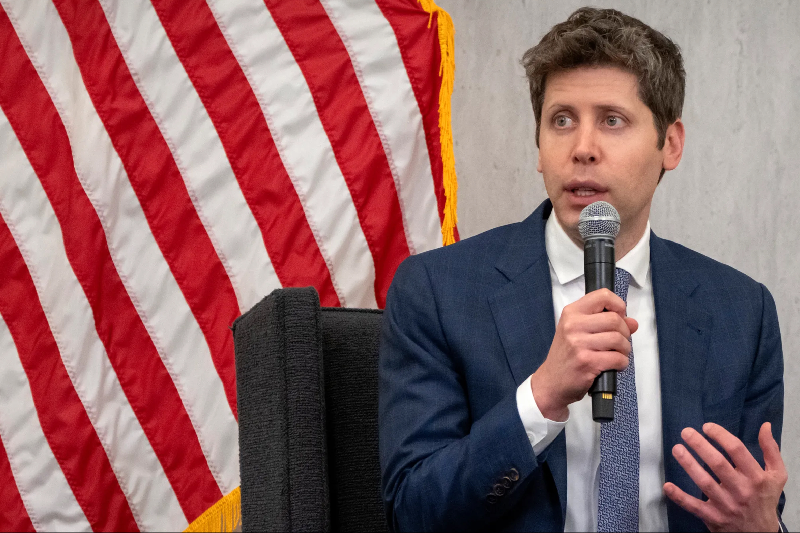
“AI Is Not Just Evolving Jobs — It’s Replacing Them”: Sam Altman Warns of a Transforming Future of Work
As artificial intelligence reshapes our world at lightning speed, it’s not just changing how we work—it’s threatening to eliminate entire categories of jobs. In a candid and forward-looking address at a recent Federal Reserve conference in Washington, Sam Altman, CEO of OpenAI, laid out a clear message: we’re no longer dealing with hypothetical futures—AI is here, and its impact on human labor is accelerating faster than many are prepared for.
Altman, the driving force behind ChatGPT and other foundational AI models, shared insights that combine optimism with sharp caution. While AI brings with it powerful tools and efficiencies, it also ushers in an era of unprecedented disruption—especially in the service sector.
Customer Service Jobs May “Disappear Entirely”
Among the industries expected to be most affected, Altman pointed to customer support as a prime example of an area AI is already poised to fully automate. “That’s a category where I just say, you know what, when you call customer support, you’re on target and AI, and that’s fine,” he remarked at the event, according to The Guardian.
Altman’s bluntness reflects an evolving reality. AI tools, including language models like ChatGPT, can now handle entire customer service workflows—from handling basic queries to managing complaints and processing refunds. These systems function around the clock, never get fatigued, and eliminate the emotional friction that can arise in human interactions. As businesses seek greater efficiency, this kind of automation becomes increasingly attractive.
And it’s not just speculative. Companies across various industries are already deploying AI-driven chatbots and virtual assistants capable of nuanced conversation and problem-solving. With cost savings and scalability on their side, AI-based customer service systems are being rolled out at scale, drastically reducing the need for human agents.
Altman’s statement doesn’t merely echo long-standing anxieties around automation; it crystallizes them into present-day reality. Customer support, once considered a secure job domain, may be among the first sectors to be fundamentally transformed—and largely replaced—by AI.
Healthcare: A Complex Frontier with Human Intuition Still Needed
Yet, the outlook is more complicated when it comes to healthcare. While Altman acknowledged the vast promise of AI models like ChatGPT in medical diagnostics and decision support, he was quick to express personal hesitation.
“I would not want to rely on that without a human in the loop for my own healthcare,” he said, underscoring a crucial distinction between what AI can do and what society should entrust it to do.
AI's capability to analyze massive datasets, identify patterns, and offer probable diagnoses in record time has revolutionized parts of the healthcare process. However, Altman’s comment reflects the limitations of even the most advanced AI. Empathy, moral reasoning, and nuanced judgment—core elements of patient care—remain uniquely human strengths.
In this sense, Altman envisions a future where AI doesn’t replace doctors but works alongside them as a diagnostic co-pilot. It’s a vision rooted in collaboration, not substitution—at least for now.
Preparing for the Inevitable: Human Labor in an AI World
At the heart of Altman’s address lies a bigger and more unsettling question: Is society truly prepared for the scale and speed of change that AI is bringing?
If AI can already automate end-to-end processes in customer support today, what happens when the same technology evolves to handle more cognitively demanding roles tomorrow? What happens to economies, communities, and individuals when AI begins to replace knowledge workers in law, finance, education, and more?
These are no longer theoretical concerns. The implications of mass displacement extend far beyond economics—they touch on social cohesion, mental health, education systems, and even identity. Altman’s speech challenges governments, industries, and civil society to confront these questions now, rather than react later.
Responsibility at the Frontier
What makes Altman’s perspective particularly impactful is his position—not as a critic of AI, but as one of its chief architects. As the head of OpenAI, Altman is both propelling innovation and advocating for responsible oversight. His balanced tone—part visionary, part realist—underscores the dual responsibility of leading technological progress while mitigating its fallout.
He doesn’t call for halting progress but instead pushes for careful navigation. Whether it’s setting up safety nets for displaced workers or developing ethical frameworks for AI implementation, his remarks reflect a need for human-centered approaches as we integrate AI deeper into our daily lives.
A Shrinking Timeline for Adaptation
Altman’s speech is a call to urgency. The future of work will not simply evolve—it will be redefined. From call centers to clinics, AI will be increasingly present, often as a silent partner, sometimes as a full replacement. The timeline to adapt is rapidly shrinking.
The key, Altman suggests, lies not in resisting the tide of AI, but in steering it. How industries, governments, and individuals prepare for that shift—socially, economically, and psychologically—will define whether AI becomes a tool of progress or a trigger for widespread disruption.



